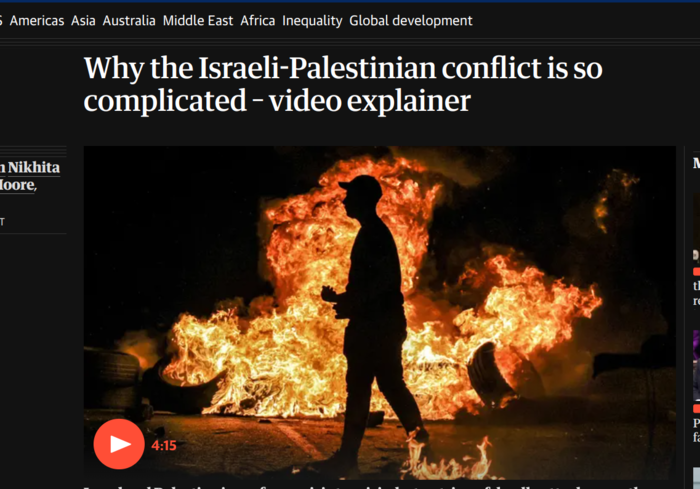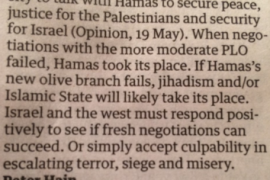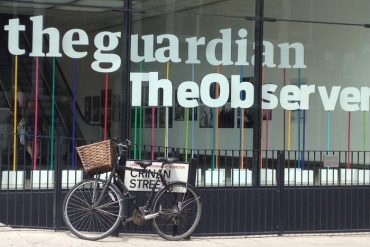A Guardian video “explainer” featuring Jerusalem correspondent Bethan McKernan (“Why the Israeli-Palestinian conflict is so complicated – video explainer”, March 1) is as bad as we suspected it would be.
First, we’ll begin with the errors and distortions.
McKernan tells viewers that all the goal of all the Palestinian factions in the West Bank and Gaza is merely to end the occupation, failing to note that some of those factions – such as Hamas and Palestinian Islamic Jihad – want Israel “to end”, and reject right of a Jewish state to exist within any borders.
She refers to Hamas merely as an Islamist Movement, without noting that both its military and political wings are proscribed as terrorist groups by the British government and much of the West.
She claims that since most east Jerusalem Palestinians don’t have full Israeli citizenship, they face hardships accessing services, which is highly misleading. Such Palestinians who are permanent residents of Israel have most of the privileges that citizens have: the right to healthcare and other social benefits, the right to travel anywhere in Israel or the West Bank and the right to vote in municipal elections.
She says that Palestinians in Gaza have “the rawest deal”. Yet, while noting the difficulties faced by the population there, omitted is any mention of the hardship of living under totalitarian Hamas rule.
Gazans are suffering under the corruption and oppression of Hamas.
In this installment of @PeaceComCenter's "Whispered in Gaza," the speaker doesn't mince words about life under Hamas's misrule. pic.twitter.com/Pj8wDuxPP4
— CAMERAorg (@CAMERAorg) January 23, 2023
Viewers are then told that “Israel controls everyone that comes in and out of Gaza”, which is, of course, false, as Egypt controls what comes in and out of Gaza along the southern border.
She then argues that settlements – even in areas of the West Bank that PA leaders have conceded would remain part of Israel in a peace agreement – represent the only real impediment to a two-state solution, without mentioning that Palestinian leaders rejected multiple Israeli peace offers which would resulted in the creation of a Palestinian state.
She claims that “Benjamin Netanyahu has had no interest in pursuing the peace process at all”, which ignores his government’s participation in US sponsored peace negotiations in 2013-14. (In fairness, McKernan does say that the Palestinians also haven’t had an appetite to resolve the conflict.)
Now, moving from the errors to the errors of omission:
Throughout the video, McKernan avoids mentioning the problem of Palestinian terrorism, extremism and antisemitism as major impediments to peace.
In fact, the only time she even obliquely alludes to terror is when, in discussing the rounds of fighting between Israel and Gaza, she said “rockets have been fired on both sides”. However, this creates an entirely false equivalence between the firing of deadly projectiles – by terror groups committed to the Jewish state’s destruction – at Israeli civilian communities, and IDF retaliatory strikes on military targets in the strip.
By obfuscating the correlation between the bad decisions by the Gaza and PA leadership and bad outcomes for both Israelis and Palestinians, the Guardian’s Jerusalem correspondent erases Palestinian agency and ensures that her readers will remain woefully ignorant about some of the most important factors perpetuating the conflict.
Related Posts
Guardian op-ed calls terrorists who murder Israelis “political prisoners”





